ALL ABOUT TOWANDA
This page is dedicated to the city of towanda
|
This was an article about Towanda, Kansas published in the Walnut Valley Times on March 31, 1899. It gives a current state of the town at the at time, including brief descriptions of some of the residents. Do you have any relatives listed? We would love to include more photos of the people mentioned in this article. Please contact the TAH Museum at 316-536-2500 or [email protected]. 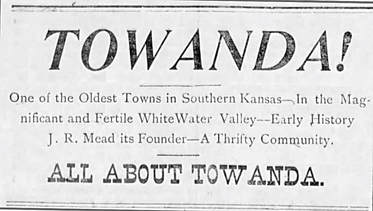 In all Kansas there is no more beautiful valley than that of the Whitewater, from its head to where it empties into Walnut at Augusta. No other lands in this state surpass these in fertility and the per cent of tillable land in the given area is not exceeded by any other equal section of the state. Many of the first settlers still live to sing the praises of a land that in climate, soil, products and rapidity of development had no parallel in the state’s history. These old settlers, and the newer people to the region, are an intelligent, reading, conscientious people. They are independent in thought, enterprising and prosperous. Thirty years ago in the little log cabin, nine miles west and south of El Dorado was an Indian trading post and relay station where horses were changed on the stage line between Camp Supply and Fort Sill. Groceries and all other necessaries of life were freighted from Emporia, the nearest railroad station. Buffalo were near and were hunted for their meat and hides. Smaller wild game was abundant. Many years a hunter and Indian trader, James R. Mead, a resident now of Wichita, was the owner of the trading post and from him Rev. Isaac Mooney purchased a claim of 160 acres. This claim had upon it the one log house, and a fine and never-failing spring which was a particular item of interest to government trains and emigrants. 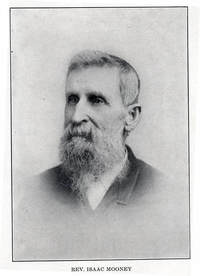 Rev. Issac Mooney came here from Illinois and with his little family settles on the Kansas plains where there appears Little encouragement from a society point of view and seemingly scanty hopes in business prospects. However, he partitioned the cabin into two rooms, lived in one part and stocked in other with groceries and when a post office was established he fitted a corner for that purpose. After a while, he came to believe that the valley of the Whitewater, being so fertile, the country surrounding so productive and the conditions altogether so favorable, that a town would assuredly thrive. So he had a site surveyed, the little village was born under Kansas’ sunny skies, upon the rolling prairies. It grew rapidly, It became an important little burg and even aspired to be the county seat of “the State of Butler.” It increased steadily, schools, churches, lodges, stores and dwellings were established, and it was named Towanda. In 1892 a terrible cyclone swept away the little town and killed several of its people. It was on the last night of March, seven years ago. The evening say a happy people. The morning beheld a wrecked and desolated village. Eight victims lost their lives, Dr. J. D. Godfrey, Herschel Cupp, Miss Annie Robbins, Fera Maxwell, Earl Kerr, William Bailey and infant children of Elmer Hall and John Blake. Many were seriously wounded. The place has never fully recovered from the terrible shock, though its business men are thriving and farmers and stockmen are thrifty and progressive. GAR and WRC organizations have been in existence about fourteen years. The knights of Pythias lodge was a nicely fitted hail in which that order and Rathbone Sisters meet. The Masonic lodge and Eastern Star, meet in the upper room of the school building. There is also a Modern Woodmen organization and lately instituted order of the Knights and Ladies of Security. Religious faith is represented by three denominations, the Methodist Church, in charge of Rev. Asher of Augusta; the Christian, presided over by Rev. Isaac Mooney and the Universalist which is not active at present. 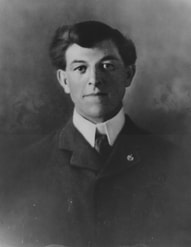 Professor Eckert Professor Eckert My visit to the school was necessarily rather short, but it did not take long to observe the orderly and business-like methods of both teachers. Miss Mabel Hunt, who is having her first experience in this work, is establishing a marked reputation for herself as a natural and well qualified teacher. She has instructed her little folk well and artistically in music and the accomplishment is one of which to be proud. The best of order prevails in her room, her pupils are studious and ambitious. There seems to be no jars, no unpleasantness. Her enrollment is 38, with 24 in average attendance. Her grades comprise the chart, first, second and third. The chart class is Miss Hunt’s particular pride, having completed the abstract work on the chart and the First Reader and are now reviewing. They are also rich right up in the work in numbers and writing, and unusual record for a class in one year. the other grades are also well qualified and all are steady workers. Byron Mooney, of the third, a bright, interesting little fellow, has not been absent or tardy during the term. The advanced room, taught by Prof. E. F. Eckert, a man of thirteen years experience, is equally as orderly and progressive. His control of his pupils is easy and exceptional. His average attendance is about 23, which 38 enrolled. His most advanced pupil is Miss Oreta Porter, who has twice successfully passed the examination for county diploma. She is working in advanced branches this year and making a very marked success. Ralph Ralston and Miss Sadie Robison are applicants for county diplomas this year. Miss Myrtle Mooney has a record for being present each day of the term and not a tardy mark against her name. Prof. Eckert has an interesting German class of private pupils who are mastering the language readily, their lessons being heard after school hours. Mr. Eckert has been in Kansas ten years and has a wife and two small children. He homesteaded a strip of land 17 rods wide and a couple miles long, south of Towanda. When the state was surveyed, one surveying party began at the south line and the other at the fifth parallel, working towards each other. When they met, this narrow strip of land lay between the sections measured. It passes entirely across the state and widens towards the west. Mr. Eckert is almost ready to prove upon this claim and if he wishes, can probably sell it to farmers whose claims it borders. In school work, Mr. Eckert certainly excels. His training will undoubtedly make a lasting impression on his pupils. Reverend Issac Mooney, the father of the town, still resides there, one of the most respected and loved of its citizens. He and his good wife are caring for Byron Mooney, their little grand-son, and their home is yet the home of their children whenever the visiting days arrive. VP, Joe, S R, Mrs. Dr. Johnson of Cottonwood Falls, Mrs. Edgar Spaulding, Mrs. M. Orban, Mrs. A Swiggett, and Walter, comprise the heirs of this kindly couple. Walter Mooney, postmaster, recalls many interesting pioneer experiences that were forcibly impressed on his then boyish mind. His school days at first were passed in a little log school house over the floor of which, mice and lizards ran at will. He remembers distinctly, the twenty barrels of flour brought from Illinois, the holidays that were almost unknown to children then, the ten or twelve pupils who walked long distances to attend the subscription school and many other items of interest. Mr. Mooney married Miss Jennie Turner, owns his homes and has two interesting young daughters, Myrtle and Eulalie. A. Loncer has been in business in Towanda since 1884, the year the Mo. Pac. railroad was built through the town. He is a registered pharmacist, the only one in the place, and began with an exclusive stock of drugs. He was formerly from Terre Haute, Indiana. He owns his store, home and one of the finest farms in Benton Township. His stock now comprises a large assortment of dry goods, staple groceries, boots, shoes, furnishing goods, confectionery, stationery and drugs. Mr. Loncer’s stock is all first class and meets the demands of the surrounding vicinity to a nicety. He runs a wagon through the country, in charge of Leo Hill, who buys and sells produce and adds a great deal to the firm’s trade. Mr. Loncer married Miss M.E. Yurgenson and has two little daughters, Maggie and Grace, the older an artistic little needlewoman. Mrs. Loncer’s sister, Miss Lucy Poorbaugh, makes her home with them and has a millinery stock. Bert Hill, Mr. Loncer’s obliging clerk, has spent the greater part of twenty-two years in Towanda. He and his brother, Leo, came with their parents from Pennsylvania. Their father, A.S. Hill, had a store in Towanda in the early days, but after the death of his wife, removed to Oklahoma. F.P. Gillespie, one of the most prominent farmers and stockmen in this part of the country, was born in Pennsylvania, lived in Iowa, Illinois, and finally came to Kansas where he settled at El Dorado, in 1881. He was one of the organizers of the State Bank of El Dorado and occupied the position of cashier for eleven years. Six years ago, he moved his 600 acred farm north of Towanda - a very fertile tracts of land which is well improved. He handles about 350 head of cattle each year. Mr. Gillespie has since been twice elevated as a populist to the legislature. Besides his son, Will, and Misses Grace and Sadie, he has a little five year old daughter, Eleanor. His wife deserves much credit for her lively interest and care in the administration of home affairs. 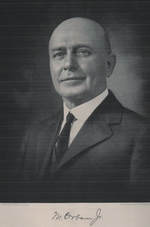 M. Orban M. Orban M. Orban has a general merchandise stock. He came to Butler County fifteen years ago, beginning all new, with no particularly bright prospects. He now claims the largest business in the town and certainly he is prospering. He was married to Miss Luella Mooney, and their two little twin daughters, Vivian and Corrine, are the delight of all who know them. Mr. Orban owns his home, his store building and 160 acres of land close to town, which he rents and stocks with cattle. He has been in business thirteen years. He has the only ice house in the town and put up about 100 tons this winter for the homes demand. He also runs a produce wagon from ten to fifteen miles into the country, to meet and solicit trade. He is a busy and enterprising man. The wagon is in charge of M. Maxwell. Besides himself, Mr. Orban employs two clerks, F.R. Reed and Joseph Mooney. If there’s anything from a nail to a sack of four that Mr. Orban hasn’t, in his store, it must certainly be an unusual article. He buys his flour by the car load and other things in large quantities. This enables him to meet any sort of competition. He also has a large assortment of general dry goods, groceries, boots, shoes, confectionery and cigars. He handles all kinds of garden seeds in bulk. Standard sewing machines are one of his specialties. Carpets, stationery, in fact, everything one can think of, unless it be bicycles or plows, are in sight. Joseph Mooney, who is employed by M. Orban, has had a varied experience in travel. He recently returned from the Pacific Coast, where he had been a member of a California volunteer regiment. His home is with his parents, as is also that of his little son, Byron, a bright and winning boy. J. C. Kullman, hardware merchant and dinner, came from Illinois sixteen years ago. he married Miss Emma Pesole and she, with his two children, Harry and Ivan, grace his home. Mr. Kullman spent two years in St. Louis, but recently returned to Kansas like everybody else who goes away. He declares it is the best place on earth. He has a prosperous business. 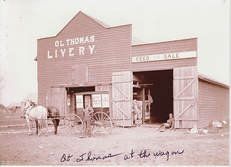 O.L. Thomas Livery and postmaster O.L. Thomas Livery and postmaster O.L. Thomas has the only exclusive grocery store in the town. He came here five years ago and until recently was engages in the livery business. He owns his store building and residence. His wife was Miss Eva Mosier. Mr. Thomas has just reviewed a new invoice of flour, breakfast foods and fancy groceries. In his line, he declares that he has the best business in the town to get cheap goods and liberal treatment. His fruits, fresh meats, candies, cigars, queensware, canned goods and other articles are of the choicest. His bright little store is all the time a busy place because his stock is of the best. Claus Stearns is his pleasing clerk. One of the oldest settlers in the community is Daniel Mosier, who came from Illinois in 1868. Besides the trading stations, there was but on house in the state west of Towanda. His family consisted of a wife and eight children when he emigrated. Four younger children were born in Kansas. Only five are living, Jonas, at home, Daniel, Miles, Mrs. William Graves in MIssouri, and Mrs. Thomas. Mr. Mosier purchased his claim two miles north-west of town, from Ben Kind of El Dorado. Sorrow has its place in the pioneer life and four children died with scarlet fever inside of four weeks. Mr. Mosier hunted buffalo all over the south-western plans, had the discouraging and fearful experience of the grasshopper and cyclone years, saw the birth and life of the little city and now, at the quiet part of life’s journey, finds himself possessed of a comfortable home and, with his boys, owning about 720 acres of fine land. A.R. Johnson has spent some nine years in the blacksmith business in Towanda. He and his wife and daughter, Nellie, are comfortable settles in a home of their own. He also owns a blacksmith shop. B.L. Wheeler, who lives south of town in a cozy little home built a couple of years ago, has been in Butler County about twenty-five years. He married Miss Lora Walt. Mr. Wheeler handles some cattle but farms principally. His pretty children are Ross, Lynn, Merton, Edith and Calvin. J.W. Eckhardt, a resident of Kansas for the past twenty-one years, came with his parents from Illinois. He learned his trade with A.R. Johnson, with whom he worked several years. His wife was Miss Maud Swiggett. About a month ago, Mr. Eckhardt opened a blacksmith shop of his own. His long acquaintance with the Towanda people gives him precedence with them. His work is well done and is always at reasonable rates. He tries to compete with any other workman in thoroughness and low prices. Everything done in general blacksmithing is a par of Mr. Eckhardt’s business. The only physician in town is Dr. J.L. Owen. He was born in Jefferson County, Kansas, in 1859, secured his education in this sate and was the first graduate form the first medical college in Kansas, situated at Topeka. He attended his Alumni meeting at the capital last week. For four years, he practiced in medicine in the vicinity where he was born and raised manhood. He then moved to El Dorado, where he and his wife spend about five months. Finding an opening in Towanda, he began practicing here three years ago. He can not say too much in praise of the Towanda people. J.E. Phares and wife who keep the hotel, have lived in Kansas fifteen years. After the Towanda cyclone, they with their two children, Rosa and Clarence, moved to Alva, Oklahoma. Here they spent five years, returning to Towanda a couple of weeks ago. Mr. Phares purchased the business house in which James Dodwell has a harness shop and will put in a restaurant about July 1st. James Dodwell, the well known pioneer harness maker of Butler County, settled at El Dorado in 1871. As a boy, he entered the army from his home in Kalamazoo, Michigan, as a drummer boy. He was in Bouton’s Chicago battering, which was under fire seventy two different times and never lost a gun. While in California last year, Mr. Dodwell attended the funeral of General Rosencranz in Los Angeles. His former captain, General Bouton, was once of the pall bearers. Mr. Dodwell marched in the funeral procession, beside and ex-confederate soldier, and counted him his fellow countryman. Mr. Dodwell was also introduced by General Bouton to the editor and proprietor of the Los Angeles Times, General Otis, who is now commander-in-cheif at Manila, Philippine Islands. General Otis appointed Mr. Dodwell saddler for the California regiment during the Spanish-American War, but he was never called into service. Mr. Dodwell made the first set of harness ever made in this country. He helped build El Dorado. A cozy little harness shop is fitted up for his present use. He has a satisfactory trade. Jimmy is one of the country’s land marks and is an estimable man and honored citizen. H.C. Logan, the Towanda Liveryman, has been in the business in Towanda ten years. For the past year, he and his wife had charge of the hotel. He has a nice home recently purchased; a wife and children, Merie, Chaning and Charles, complete his family. Mr. Logan has the only livery barn of the town, keeps two hands, has a nice line of new buggies and as fine livery stock as can be found in the country. He is obliging and his customers are pleased with his treatment. His terms are reasonable and fair. F.E. Straw has a barber shop where he has been for five years. His father, J. C. Straw, came here from Ohio in 1870. He took a homestead north east of town and has seen all the ups and downs of pioneer life. George Cornelius and wife are Ohioans. Fifteen years ago they made Towanda their home. Mr. Cornelius carries the mail from Towanda to Murdock, six miles, three trips each week. This has been his work for the past ten or twelve years. Gold or warm wether are alike to him, his work must and does go on. Besides this trip, he carried the mail between the post office and depot. His children are all married. Elmer is a section foreman, Bert is a stockman at Augusta, Mrs. Frank Newman lives at Bodare and Mrs. Joe Morris lives south of town. A.J. Shumway who came from Ohio, spent two years in Kansas before he came to Butler County which was ten years ago. His farm of 220 acres lies just south of town. A new house has just been finished. Mr. Shumway handles high grade short-horn cattle. One daughter, Miss Nora, is at home and two are married, Mrs. Ida Bosworth of Ohios, and Mrs. John Winchester who lives near her parental home. Loyal Wait lived north of Towanda six years of the twenty-two he has spent in Kansas. He was born in Ohio, but came to this state from Illinois. He owns a good bottom farm of the 160 acres on the east side of the Whitewater. Miss Etta, who is the only daughter now at home, is a talented your lady of music. She is also a skilled needlewoman. Another daughter is Mrs. Bert Wheeler. Mrs. Wait has a cool, comfortable residence in a livery spot surrounded by trees. C.R. Wait is a brother of Loyal Wait and their two farms join. he has been here but seventeen years. His pleasant and estimable wife was Miss Lillie Wheeler, a Kansan now for twenty-five years. Mr. Wait, like his brother, has 160 acres of ground which he purchased a year ago, from his mother. They have two children, Coral and Howard, in school and Mildred and Ruth at home. Mrs. Lucy Wheeler came to Butler county twenty-five years ago. A few months after their arrival, her husband died and she, with a woman’s never failing courage, faced the storms of pioneer life bravely. She proved up on her claim and withstood the trials of “grasshopper year,” and other hardships. Her children are all married expect Earl. Besides Mrs. Wait and Bert, who are residents of Butler County, Mrs. Scott Taylor lives at Oswego, Kansas, where her husband, a former Towanda, is a jeweler and band director. Mrs. Lucy Reese is a widowed. She lives at Ravenna, Ohio, where she is teaching in the public schools. Her three children are in school there and the oldest will graduate this spring. Mrs. Reese was a bring, intelligent teacher who once taught in the El Dorado public schools. Earl and Mrs. Dollie Brackets live in Raton, New Mexico, where Mrs. Wheeler spent the winter. Mrs. Ida Straw lives in Illinois. 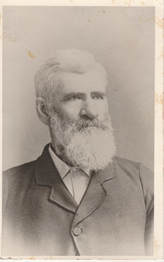 Samual C. Fulton Samual C. Fulton Samual C. Fulton, who’s native state is Illinois, came to Kansas in 1863 - is one of the earliest pioneers. He lived at Towanda seven years and bought his present home place in ’69. Upon his farm was a log house partially finished. He how has a fine roomy residence built in a picturesque spot under large trees. A spring ripples cheerily along at the foot of the hill. Another spring in a pasture has never been know to fail. Two years ago, Mr. Fulton buried his wife. His daughter, Mrs. Ida Robison, and two little ones, Helen and Sara, and Miss Eva, his youngest daughter, keep house for him. Eugene farms near his father’s place. Frank lives in El Dorado. Both boys are married. Mr. Fulton has altogether, 515 acres of land which he will divide among his children. He handles Poland China hogs extensively and has about 60 head. Josh Shriver is another early settler. Mrs. Shriver was a Virginian and Mr. Shriver a native of Indiana. He took claim and built one room before he sent for his wife. He met her at the railroad terminus, at Florence. She had with her their oldest son, Charles, who was then a very small boy. Mr. Shriver has 160 acres of land but is farming 500 acres. He is feeding 150 head of cattle. Six years ago, he completed a nice large dwelling. John and Miss Ella are both employed at Kingfisher, Oklahoma. Ed is married and lives at El Dorado. Charles runs the farm and the younger children are James, Bertha, Fred and Nellie. All of these children are Kansans except Charles. Miss Ella taught school here several years. She is now a successful and experiences milliner. Miss Bertha has a particular musical talent. “Talking of the early days,” said Mrs. Shriver, “a man came to the house and asked us if we had seen the grasshoppers flying south overhead. We noticed them, but thinking nothing of the dense cloud because it was so high above us, we started to Mr. McClure’s for plums. Suddenly the wind changed and immediately the insects settled. In one afternoon, the blades, ears, and stalks of corn were completely eaten up by them. We had two good hogs and two beeches and some of our folds send us apple-butter and other things form the east, so we fared pretty well. Less fortunate people suffered.” 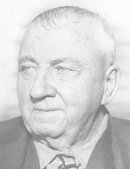 Joseph H. Porter Joseph H. Porter J.H. Porter has been in Kansas about fourteen years. They were form Iowa. A nice new home in Towanda adds much to the comfort of his family. Mr. Porter is perhaps the most extensive stock dealer in this part of Butler, handling thousands of head of cattle each year and owning about 1000 acres of land adjoining Towanda. He is also interested in Western cattle to some extent and owns some property in different parts of the state. His children, Oreta, Bessie and little Helen are bright, progressive young ladies who give evidence of their mother’s careful training, culture and refinement. James and A.J. Ralston, are brothers who came from Illinois in 1864. Each own 320 acres of the finest land in the country. Both are married and have nice families. Their homes are but two miles apart. James has 100 head of cattle for full feeding. They are among the county’s best citizens. Mr. A.J. Ralston has been the choice of his party for public place and is now mentioned as the republican nominee for county treasurer. R. B. McClure has one of the the nicest homes among the Towanda farmers. He came here in 1871 from the northern part of the state and took a homestead. When the grasshoppers ate everything they had they went to Missouri, but returned to their claim two years later. A couple of families had camped together and a house was soon erected. Mr. McClure made the first wagon track across the prairie to the Whitewater. For some time, they hauled water from Towanda, a distance of three miles. Miss Bessie is their only daughter unmarried. Mrs. McClure recalls a day when corn meal was $3.00 a hundred, bacon twenty-five cents a pound and eggs twenty-five cents a dozen. Mr. McClure rents his farm but attends to some stock. He’s one of the county’s best citizens. 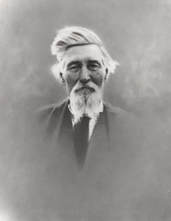 Daniel H. Cupp Daniel H. Cupp Perhaps the fist settler in this part of the country, who is now living here is D. H. Cupp, who came fro Michigan in 1860. His whole life has been a pioneer experience, for he emigrated to Michigan when i twas only a territory. He was raised with Indians as neighbors. Soon after taking his homestead, he was married to Miss S. C. Malen. The next day he enlisted and left his bride, to serve his country. During his absence, Mrs. Cupp lived in Lyon county with relatives. Mr. Cupp never saw active service, but was a “bush wacker” and did guerrilla work mostly. He was stationed at Fort Leavenworth and says the place presents a very different appearance now to what it did then. He returned to Kansas and took another claim, after the war. In 1872, he built his present stone house, hauling much of the material from Newton and Wichita. He paid $6.00 a thousand for shingles and remembers when corn meal was $8.00 per cwt, and flour $12.00 per cwt. His fine farm lies on both sides of the Whitewater and Cupp’s grove is a popular picnicking group. Mrs. F.E. Straw, Bert, Sheridan, Roy and Bennie are their children. Herschel, another son, was killed in the Towanda cyclone. Mr. Cupp is master of the Masonic Lodge and Mrs. Cupp is worthy matron of the Eastern Star. T.C. Sorter has 320 acres of land a couple miles from town, half bottom, and half upland. He has about fifty head of cattle. He and his wife, who are highly respected citizens, came from Texas in 1870. A.W. Stearns is another from Illinois. He was county clerk in this county and afterward edited a newspaper in Missouri, but returned to Kansas. He took his homestead of 160 acres in 1870. He is a man of intelligence and advanced thought. Charles Mornhinweg is one of the earliest pioneers. He is intimately acquainted with nearly every one of the earliest comers to Butler County and has taken no small part in redeeming the “desert.” He owns a magnificent farm of 320 acres on the Whitewater Valley and is rated as on of the county’s conservative, substantial and reliable citizens. M.L. Helena, an extensive farmer south of town, and an interested worker in the church, handles Poland China hogs and Plymouth Rock chickens with some other fine stock. his children are all exceptionally talented, some in music and others in an educational line. The Kappes family, William, John, Dennis and Miss Nora, came here with their parents in 1874. Miss Nora has done the housekeeping since the death of her parents and the boys run the farm successfully. They handle and shop stock fro some extent. Miss Nora is distinguished as the very capable head of Matilda Temple, Rathbone Sisters. 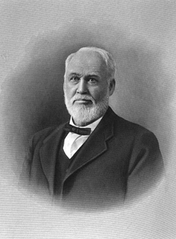 J.W. Robison J.W. Robison Edgar Robison is the resident of Towanda, with his wife and little son, James. He farms about 320 acres of land and needs 100 head of cattle each winter. He has a nice home and one of the best farms in the district. J.W. Robison and son’s farms on the Whitewater, adjacent to Towanda, consists of 5,075 acres owned by them and as much more leased. About half of this is under plow and in alfalfa. It is stocked with pure bread Percheron and French Coach Horses. These are principally used for breeding purposes and farm work. They have usually from 1500 to 2000 head of stock and fattening steers. These cattle, generally brought form Texas, New Mexico, Colorado, about double in value from their purchase to their sale, when matured, which takes on an average about one year. The farm also breeds and matures about 2000 head of finely bread hogs each year. About 300 acres of the land are devoted to corn, 400 to alfalfa and 400 to sorghum. The remainder is in wheat, oats and other crops. The ranch is well equipped with commodious houses, barns, corrals and feed lots. The Whitewater skirted with heavy timer, flows through their lands for miles. The fine and picturesque Whitewater Falls, big spring, shady native and planed groves and long boating and fishing water, make an attractive place. Besides fine stock already names, this place is the home of Short Horn and Jersey cattle, Poland China hogs, turkeys, pea-fowles, chickens and Imperial Pekin Ducks. There arrived the past week from Texas, 240 head of four-year old steers that have had no feed but they will be pastured the coming summer, and nexgt winter the fat will be laid on by corn. This ranch is not only producing goodly supplies in the vegetable and animal kingdoms, but several grand-sons and daughters to the owner. The Robisons are the highest type of successful farmers and stockmen. Charles Logan and wife are among the most prominent and beloved people of Towanda. They have lived here about 15 years, during which time they have been prominent in social circle, especially the GAR post of which Mr. Logan has been Commander several times. Mrs. Logan has filled the office of President of the WRC Several terms being at the present time in that position. She is also serving her second term as the Department Treasurer of the WRC at a salary of $300 per annum. They own a cozy home of their own. John Edmiston and wife have lived long enough here to count among them pioneers. Mrs. Edmiston has been a helpmate indeed. Their farm and stock, also their poultry, are noted for their thrifty appearance. They have raised their family here, the heaviest loss being that of their son, Willie, who died so suddenly just as he reached early manhood. Miss Lina is a charming young lady, an up-to-date teacher and good daughter, while their son Died, is the stand by in all that goes on about the fine new house. Clark Wait is the only remaining one of the pioneer brothers. He and his wife reside on their fine 160 acre farm. Mr. Wait is an old soldier. He runs part of his farm himself and the rest is leased. Mrs. Mari Wait is one of the kindliest of souls, one of the earliest comers to Butler County and cheerful even as she nears the summit of life, as a May-day morning. Her children have grown up about her and honor her good mother’s work. Richard Jones and family are among the oldest settlers. They have prospered here and raised their family to men and women, all of whom are a credit to them. Lon, Matt and Miss Brinthia are still at home. James Read, the blacksmith and wheelwright for so many years, has so far prospered as to lay aside his business for a season of rest. Owing to poor health, he recently sold his farm to E.H. Horton and will enjoy the quiet home life with his wife and six children. Col J.W. Tucker and his worthy wife, have recently sold considerable of their town property and moved out on his new farm, where they live cozily and look after the cattle on the range thermselves. Mrs. Tucker is an early pioneer, having some here from from Indiana with her mother and brothers, Dr. John and J.A. Godfrey, 30 years ago. Albert Lambing has one of the finest of farms and a beautiful home. Always more of less of a rustler, since his marriage to Miss Addie Longstreth, of Potwin, 15 years ago, he has been doubly prosperous. His live stock is among the best. Three children bless their home, Miss Lizzie and Masters Harry and Fred. William Braley and his son Matzes are prosperous farmers, have built a new home within few years and otherwise improved their place. Matzes is a master carpenter, doing the best work in his line. Charles Davis and wife own a nice little homes of their own. They live just south of town and are both prominent in several secret societies. 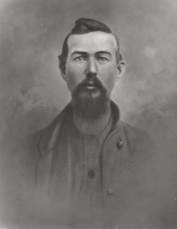 Julius Straw Julius Straw Mack Thomas is one of Towanda’s most prominent young men, highly respected, as is also J.C. Straw, or as he is always called, “Whister,” owing to his lively disposition. The latter is the able foremen of the Whitewater stock farm of J.C. Robison. E.H. Horton and family came to Kansas in 1878. He rented for three years, in order to dine a desirable location, settled on his present farm in ’81, which he has greatly improved form year to year. He has a large amount of fine stock, hogs and poultry, and is noted as always raising a good, clean crop whether anyone else does or not. His oldest son, George and family, are farming this year. Will and Miss Minnie are still at home. Reuben Reid is another prominent young man. Through having resided here but two years, he has made many friends, holds a position of trust in the township, and is one of the most accommodating clerks M. Orban has ever had. Issac Davis and wife live on the E.D.Robison farm and make home pleasant for the young men who are employed here. They are highly respected by everyone. T.J. Mossman and family have lived here for several years. Theirs sons marrying, have all moved from home. Little Tommie died three years ago. They purchased a pretty home this spring. Miss Fronia has just left for a home of her own and Misses Nola and Stella still stay to make the home life ore complete. C. Alcon and Walter Wait both take in an occasional boarder and they are always well fed and well housed. Misses Nora and Mamie Wait are the lively daughters at the Wait home. George Sharp and family came here five years ago and soon fitted into the niche intended for them. He sold his farm last winter and is now living west of town. They are dearly loved by a host of friends, both in church and social circle. Three children complete the home circle, Misses Bertha and Alma and little Edwin. C.R. McCormick and family are among the most prominent farmers, poultry raisers and dairymen. Mrs. McCormick or the girls bring the milk to the creamery while Mr. McCormick runs the farm. Mrs. McCormick’s home made cheese is greatly relished by its consumers. Mrs. Agnes Turner is still a resident among her old friends. She is especially active for one of her age, taking great pride in her children and grandchildren. Miss Hattie Hobart is a busy dressmaker, having been in business for several years. She lives alone since the death of her esteemed mother. Mr. And Mrs. Julius Straw, old time readers of the Times, still remain in their little home where the children and grandchildren love to meet. Their health is quite feeble at present. M.A. Wait farms the Stearns place, owned by his wife (nee Florence Stearns) since the death of her father and mother. He leases his own farm across the river to Charles Hibbard. Mr. and Mrs. Wait are active Knights of Pythias and Rathbone members. They have four nice children, Vena, who is noted as a sweet singer and masters Mariner, Dell and Frank. W.B. Gage, the Missouri Pacific agent and telegraph operator, has been a resident of the town but a couple years. He has a newly built little cottage home close to work. He seems a genial and clever representative of the company. 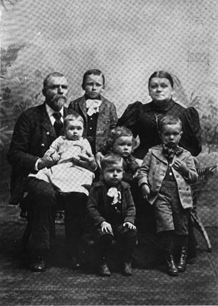 Issac Hammond and wife with their grandchildren, Florence and Richard Valentine, John Isaac, Mildred and Myra Hammond. Courtesy of History of Butler Co. Kansas cir 1916. Issac Hammond and wife with their grandchildren, Florence and Richard Valentine, John Isaac, Mildred and Myra Hammond. Courtesy of History of Butler Co. Kansas cir 1916. Mr. and Mrs. Isaac Hammond have a commodious house and a well-improved farm of about 900 acres, which is farmed by his children. Twenty-eight years ago when there were but a few settlements in this country, they came west. From May to August, they lived in a tent. This was the year of the El Dorado cyclone and the night it occurred, Mr. Hammond placed her three children in a box with had seven as a receptacle for goods in their emigrant-wagon. Two sheets which were used for a kitchen was blown into shreds. Mrs. Hammond says that was the most lonely night she ever experienced. A horse picketed on the prairie neighed all night. The original house of two rooms is now a part of their residence. Prosperity has certainly smiled upon them, for they, like other pioneers, began here with but little. J.B. Roberson settled close to Augusta when he came to Butler County twenty-eight years ago. A few years later, he was married. His was one of the first weddings in the vicinity. Mr. Roberson has a nicely located farm. Two children live in Illinois. Mesdames J. I. Valentine, N. F. Watson, and Sidney Hammond live near their parents. The four Hull brothers are prominent farmers and stock raisers. They are Ohio people, greatly respected, and have fine farms. S.B. Loomis, who recently purchased the fine farm of R.J. Maulsby, came from Ohio six years ago, and purchased 320 acres of land at Gordon. Of this he sold one-half, retaining the bottom land. he has a car of cattle at Gordon, which he has full did this winter. His only son, Morris, is standing college in Ohio and little Miss Grace, is as yet too young to begin her school education. Mr. Loomis will improve his present home and expects to buy more land adjoinging. He will farm extensively. Mrs. Emma Jamis, one of Towanda’s earliest settlers, owns several pieces of property in town and also has a dressmaking establishment. She is from Illinois, but counts herself a genuine Kansan.
0 Comments
Leave a Reply. |